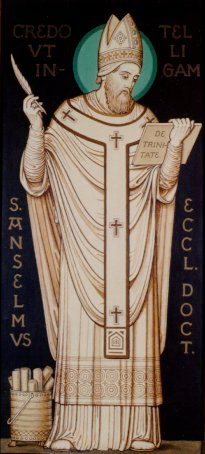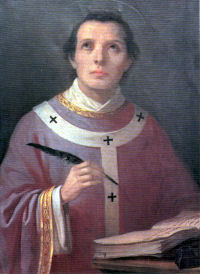Online source: www.breviary.net
| The Psalms and Antiphons for the Second Nocturn are taken from the Common | |
Absolutio: Ipsíus píetas et misericórdia nos ádjuvet, qui cum Patre et Spíritu Sancto vivit et regnat in sæcula sæculórum.R. Amen. | Absolution: May his loving-kindness and mercy assist us. Who, with the Father, and the Holy Ghost, liveth and reigneth, for ever and ever. R. Amen. |
V. Jube domne, (Dómine) benedícere. | V. Vouchsafe, Reverend Father (O Lord), thy blessing. |
Benedíctio 4: Deus Pater omnípotens sit nobis propítius et clemens. R. Amen. | Benediction 4: May God the Father Almighty shew us his mercy and pity. R. Amen. |
| Lesson iv | |
 | |
Philíppus Bethsáidæ natus, unus ex duódecim Apóstolis, qui primum a Christo Dómino vocáti sunt : a quo cum accepísset Nathánaël, venísse Messíam in lege promíssum, ad Dóminum dedúctus est. Quam vero Christus eum familiáriter adhibéret, illud fácile declárat, quod Gentíles Salvatórem vidére cupiéntes, ad Philíppum accessérunt ; et Dóminus, cum in solitúdine hóminum multitúdinem páscere vellet, sic Philíppum affátus est : Unde emémus panes, ut mandúcent hi? Is, accépto Spíritu Sancto, cum ei Scythia ad prædicándum Evangélium obtigísset, omnem fere illam gentem ad christiánam fidem convértit. Postrémo, cum Hierápolim Phrygiæ venísset, pro Christi nómine cruci affíxus lapidibúsque óbrutus est, Kaléndis Maji. Ejus corpus ibídem a Christiánis sepúltum, póstea Romam delátum, in basílica duódecim Apostolórum una cum córpore beáti Jacóbi Apóstoli cónditum est. | Philip was born in the town of Bethsaida, and was among the first of the twelve Apostles called by the Lord Christ. Then Philip findeth Nathanael, and saith unto him : We have found him of whom Moses in the Law, and the Prophets, did write. And so he brought him to the Lord. How familiarly he was in the company of Christ, is manifest from that which is written : There were certain Greeks among them that came up to worship at the Feast : the same came therefore to Philip, and desired him, saying, Sir, we would see Jesus. When the Lord was in the wilderness, and was about to feed a great multitude, he said unto Philip : Whence shall we buy bread, that these may eat? Philip, after that he had received the Holy Ghost, took Scythia, by lot, as the land wherein he was to preach the Gospel, and brought nearly all that people to believe in Christ. At the last he came to Hierapolis in Phrygia, and there, for Christ's Name's sake, he was fastened to a cross and stoned to death. The day was the first of May. The Christians of Hierapolis buried his body at that place, but it was afterwards brought to Rome and laid in the Basilica of the Twelve Apostles, beside that of the blessed Apostle James. |
V. Tu autem, Dómine, miserére nobis. R. Deo grátias. | V. But thou, O Lord, have mercy upon us. R. Thanks be to God. |
 Hierapolis | |
R. Lux perpétua lucébit Sanctis tuis, Dómine, * Etætérnitas témporum, allelúja, allelúja.V. Lætítia sempitérna erit super cápita eórum : gáudium et exsultatiónem obtinébunt. R. Et ætérnitas témporum, allelúja, allelúja. | R. Light perpetual shall shine upon thy Saints, * And an ageless eternity, alleluia, alleluia.V. Everlasting joy shall be upon their heads : they shall obtain joy and gladness. R. And an ageless eternity, alleluia, alleluia. |
 | |
V. Jube domne, (Dómine) benedícere. | V. Vouchsafe, Reverend Father (O Lord), thy blessing. |
Benedíctio 5: Christus perpétuæ det nobis gáudia vitæ.R. Amen. | Benediction 5: May Christ bestow upon us the joys of life eternal. R. Amen. |
| Lesson v | |
 | |
Jacóbus frater Dómini, cognoménto Justus, ab ineúnte ætáte vinum et síceram non bibit, carne abstínuit, numquam tonsus est, nec unguénto nec bálneo usus. Huic uni licébat íngredi in Sancta sanctórum. Idem líneis véstibus utebátur : cui étiam assidúitas orándi ita callum génibus obdúxerat, ut durítie caméli pellem imitarétur. Eum post Christi ascensiónem Apóstoli Jerosolymórum epíscopum creavérunt ; ad quem étiam Princeps Apostolórum misit qui nuntiáret se e cárcere ab Angelo edúctum fuísse. Cum autem in concílio Jerosólymis controvérsia esset orta de lege et circumcisióne ; Jacóbus, Petri senténtiam secútus, ad fratres hábuit conciónem, in qua vocatiónem Géntium probávit, fratribúsque abséntibus scribéndum esse dixit, ne Géntibus jugum Mosáicæ legis impónerent. De quo et lóquitur Apóstolus ad Gálatas : Alium autem Apostolórum vidi néminem, nisi Jacóbum fratrem Dómini. | James, surnamed the Just, the brother of our Lord Jesus Christ, was a Nazarite from the womb. During his whole life he never drank wine or strong drink, never ate meat, never shaved, and never took a bath. He was the only man who was allowed to go into the Holy of Holies. His raiment was always linen. So continually did he kneel in prayer, that the skin of his knees became horny, like a camel's knees. After Christ was ascended, the Apostles made James Bishop of Jerusalem : and even the Prince of the Apostles gave special intelligence to him after that he was delivered from prison by an angel. When in the Council of Jerusalem certain questions were mooted touching the law and circumcision, James, following the opinion of Peter, addressed a discourse to the brethren, wherein he proved the call of the Gentiles, and commanded letters to be sent to such brethren as were absent, that they might take heed not to lay upon the Gentiles the yoke of the Law of Moses. It is of him that the Apostle Paul saith, writing to the Galatians : Other of the Apostles saw I none, save James the Lord's brother. |
V. Tu autem, Dómine, miserére nobis. R. Deo grátias. | V. But thou, O Lord, have mercy upon us. R. Thanks be to God. |
 | |
R. Virtúte magna reddébant Apóstoli * Testimónium resurrectiónis Jesu Christi Dómini nostri, allelúja, allelúja.V. Repléti quidem Spíritu Sancto, loquebántur cum fidúcia verbum Dei. R. Testimónium resurrectiónis Jesu Christi Dómini nostri, allelúja, allelúja. | R. With great power gave the Apostles * Witness of the resurrection of our Lord Jesus Christ, alleluia, alleluia. V. Verily they were all filled with the Holy Ghost, and they spake the Word of God with boldness. R. Witness of the resurrection of our Lord Jesus Christ, alleluia, alleluia. |
V. Jube domne, (Dómine) benedícere. | V. Vouchsafe, Reverend Father (O Lord), thy blessing. |
Benedíctio 6: Ignem sui amóris accéndat Deus in córdibus nostris. R. Amen. | Benediction 6: May God enkindle in our hearts the fire of his holy love. R. Amen. |
| Lesson vi | |
 | |
Tanta autem erat Jacóbi vitæ sanctitas, ut fímbriam vestiménti ejus certátim hómines cúperent attíngere. Nam is nonagínta sex annos natus, cum trigínta annis illi Ecclésiæ sanctíssime præfuísset, Christum Dei Fílium constantíssime prædicans, lapídibus primum appétitur ; mox in altíssimum Templi locum addúctus, inde præcipitátus est. Qui, confráctis crúribus, jacens semivívus, manus tendébat ad cælum, Deúmque pro illórum salúte deprecabátur his verbis : Ignósce eis, Dómine, quia nésciunt quid fáciunt. Qua in oratióne, gráviter ejus cápite fullónis fuste percússo, ánimam Deo réddidit, séptimo Nerónis anno, et juxta Templum ubi præcipitátus fúerat, sepúltus est. Unam scripsit epístolam, quæ de septem cathólicis est. | So great was James' holiness of life that men strove one with another to touch the hem of his garment. When he was ninety-six years old, and had most holily governed the Church of Jerusalem for thirty years, ever most constantly preaching Christ the Son of God, he laid down his life for the faith. He was first stoned, and afterward taken up on to a pinnacle of the Temple and cast down from thence. His legs were broken by the fall, and he was wellnigh dead, but he lifted up his hands towards heaven, and prayed to God for the salvation of his murderers, saying : Lord, forgive them, for they know not what they do. As he said this, one that stood by smote him grievously upon the head with a fuller's club, and he resigned his spirit to God. He testified in the seventh year of Nero, and was buried hard by the Temple, in the place where he had fallen. He wrote one of the Seven Epistles which are called Catholic. |
V. Tu autem, Dómine, miserére nobis. R. Deo grátias. | V. But thou, O Lord, have mercy upon us. R. Thanks be to God. |
 The Armenian Cathedral of St. James, Jerusalem | |
R. Isti sunt agni novélli, qui annuntiavérunt, allelúja : modo venérunt ad fontes, * Repléti sunt claritáte, allelúja, allelúja. V. In conspéctu Agni amícti sunt stolis albis, et palmæ in mánibus eórum. R. Repléti sunt claritáte, allelúja, allelúja. V. Glória Patri, et Fílio, et Spirítui Sancto. R. Repléti sunt claritáte, allelúja, allelúja. | R. Behold the firstlings of the flock, the lambs new-born who have proclaimed, alleluia : they came but just now unto the well : * They are all of a glistering whiteness, alleluia, alleluia. V. In the presence of the Lamb they are clothed with white robes, and hold palms in their hands. R. They are all of a glistering whiteness, alleluia, alleluia. V. Glory be to the Father, and to the Son, and to the Holy Ghost. R. They are all of a glistering whiteness, alleluia, alleluia. |




.jpg)

























